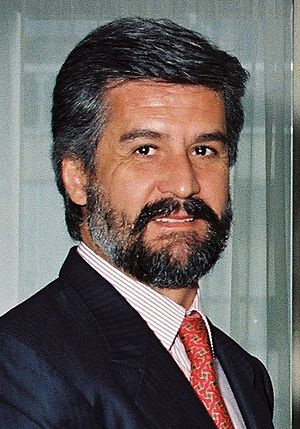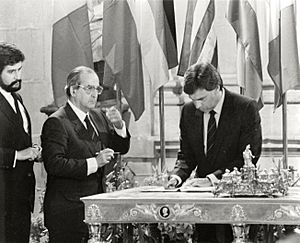Manuel Marín facts for kids
Quick facts for kids
The Most Excellent
Manuel Marín
|
|
|---|---|

Marín in 1996
|
|
| President of the European Commission | |
| Acting 15 March 1999 – 15 September 1999 |
|
| Vice President | Leon Brittan |
| Preceded by | Jacques Santer |
| Succeeded by | Romano Prodi |
| President of the Congress of Deputies | |
| In office 8 April 2004 – 31 March 2008 |
|
| Preceded by | Luisa Fernanda Rudi |
| Succeeded by | José Bono |
| European Commissioner for External Relations | |
| In office 23 January 1995 – 15 September 1999 |
|
| President | Jacques Santer Himself (Acting) |
| Preceded by | Hans van den Broek |
| Succeeded by | Chris Patten |
| Member of the Congress of Deputies | |
| In office 3 March 2000 – 9 March 2008 |
|
| In office 15 June 1977 – 29 June 1986 |
|
| Personal details | |
| Born |
Manuel Marín González
21 October 1949 Ciudad Real, Spain |
| Died | 4 December 2017 (aged 68) Madrid, Spain |
| Political party | Socialist Workers' Party |
Manuel Marín González (born October 21, 1949 – died December 4, 2017) was an important Spanish politician. He was known for his work in the European Commission, which is like the main government body of the European Union. He even served as its acting president for a short time. Many people also remember him as the person who helped create the famous Erasmus Programme, which allows students to study in other European countries.
Contents
Early Life and Political Beginnings
Manuel Marín was born in Ciudad Real, a city in Spain. He studied law at Madrid's Complutense University. After that, he continued his studies in France and Belgium, focusing on European Community Law. This showed his early interest in how European countries work together.
In 1974, he joined the Spanish Socialist Workers' Party (PSOE). He was elected to the Spanish Parliament in 1977, representing his home area of Ciudad Real. He was re-elected two more times. During his time in Parliament, he focused on foreign affairs and became a spokesperson for his party on international topics. He also worked with other socialist parties across Europe.
Manuel Marín's Work in Europe

After his party won the Spanish elections in 1982, Marín became the State Secretary for Relations with the European Communities. This meant he was the main negotiator for Spain to join the European Communities, which later became the European Union. Spain had recently become a democracy, and joining Europe was a big step for the country.
The negotiations were successful, and Spain joined the European Community on January 1, 1986, along with Portugal. Marín was chosen as Spain's first member of the European Commission. He became a Vice-President of the Commission and was in charge of social affairs, education, and employment.
The Erasmus Programme
One of Marín's most important achievements was helping to create the Erasmus Programme. This program allows university students to study in other European countries. It has become a very popular and important symbol of European cooperation and integration.
Later Roles in the European Commission
Marín continued to serve in the European Commission for many years. From 1989 to 1992, he was a Vice-President again, this time focusing on development cooperation and fishing policies. He traveled widely in Africa during this period, working on relations with developing countries.
From 1993 to 1994, he was responsible for development and cooperation, as well as economic relations with countries in the southern Mediterranean, Latin America, Asia, and African, Caribbean, and Pacific countries. He also handled humanitarian aid.
His final term in the European Commission was from 1995 to 1999. He was elected as a Vice-President and was in charge of external relations with many regions, including the Middle East, Latin America, and parts of Asia.
Challenges and Resignation
Towards the end of his time in the European Commission, there were concerns about how the Commission was being managed. These concerns led to a special group of experts looking into the Commission's work. Following their report, the entire European Commission, led by President Jacques Santer, resigned on March 15, 1999.
After the resignation, Manuel Marín took over as the interim President of the Commission. He managed the Commission until a new one could be appointed in September of that year.
Life After Europe
After his time in the European Commission, Marín returned to Spain. He was elected to the Spanish Parliament again in 2000 and 2004. After the 2004 election, he was chosen as the Speaker of the Spanish Parliament, a very important role.
Manuel Marín was married and had two children.
Death
Manuel Marín passed away in Madrid on December 4, 2017, at the age of 68, due to lung cancer.
See also
 In Spanish: Manuel Marín para niños
In Spanish: Manuel Marín para niños
 | Janet Taylor Pickett |
 | Synthia Saint James |
 | Howardena Pindell |
 | Faith Ringgold |

